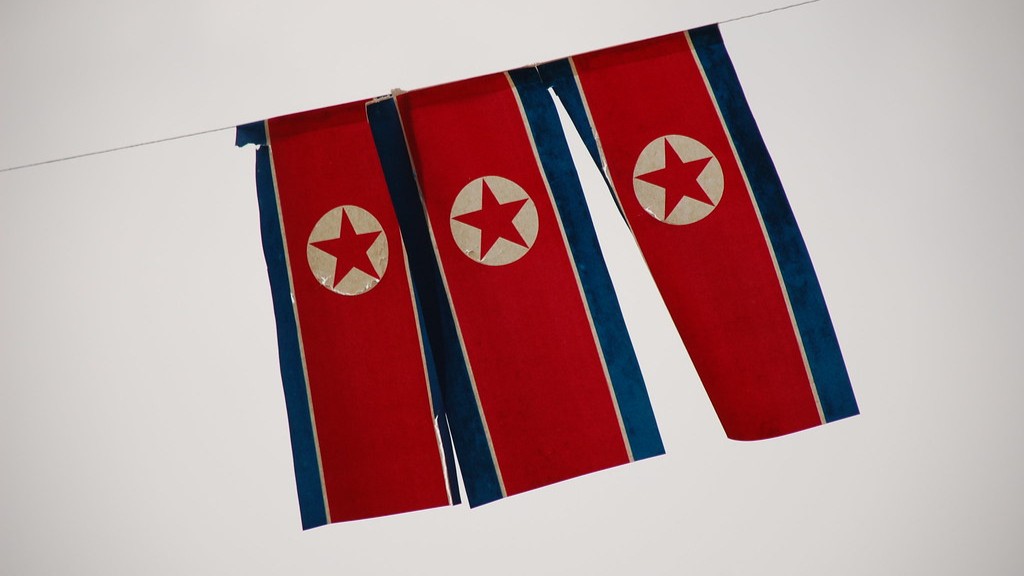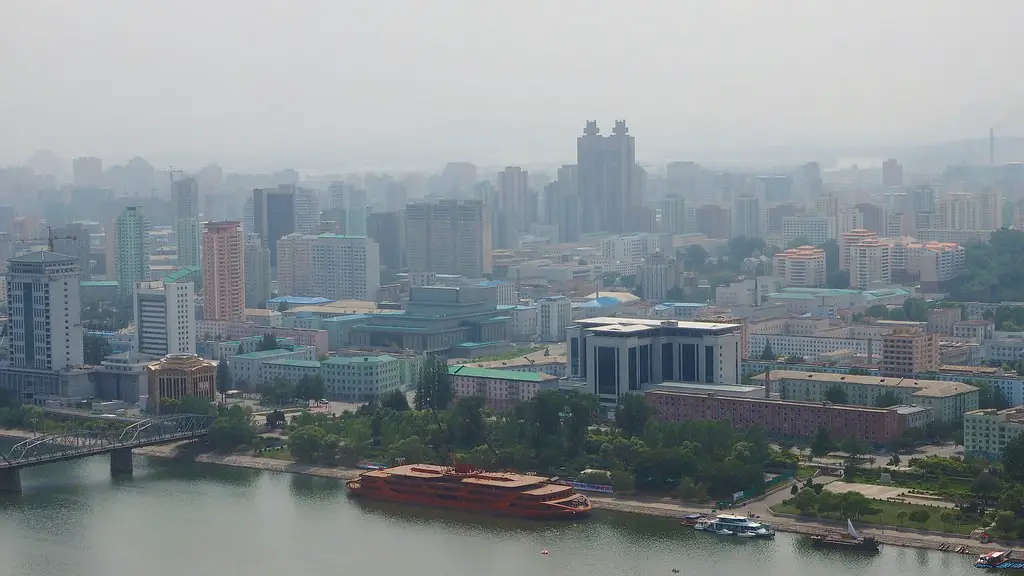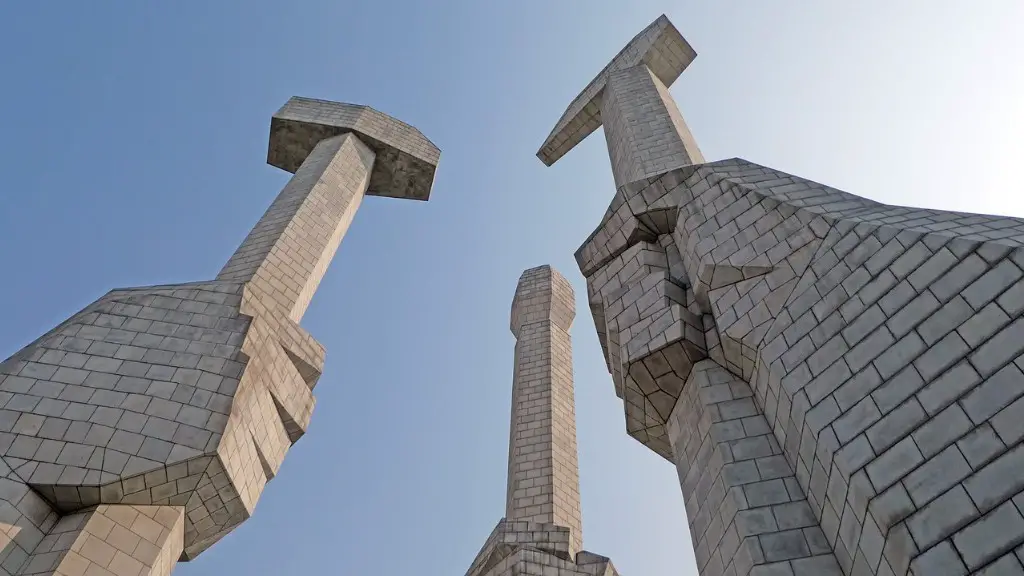The history of the North Korea Crisis dates back to the end of World War II when the country was divided into North and South Korea in 1945. The North, under the rule of Kim Il Sung, began a policy of expansion which led to an attempted invasion of the South in 1950. This eventually resulted in the three-year-long Korean War, a conflict which saw considerable loss of life on both sides, although the South was ultimately victorious. In the decades that followed, North Korea built up a nuclear weapons program that is estimated to now have around 30 active warheads.
Kim Jong Un, who inherited the title of Supreme Leader from his father in 2011, has pursued a policy of sabre-rattling since coming to power. He has frequently threatened to attack his enemies with nuclear weapons, most recently in 2017 when he threatened to fire missiles at the US territory of Guam. This has been met with varying degrees of response from the international community, with the US and other countries imposing economic sanctions on Pyongyang for its provocative behaviour.
Experts disagree as to why North Korea has become embroiled in a nuclear weapons crisis. Some believe that Kim Jong Un is a responding to his country’s perceived international isolation and its need to be taken seriously on the world stage. Others argue that his rapid military expansion is being driven by domestic politics, such as a desire to retain control over the people of North Korea.
The international community has responded by engaging in a “diplomatic dance” with North Korea in an attempt to encourage it to end its nuclear program. This has included the US-led Six-Party Talks in 2003 and regular visits from international figures such as former US President Bill Clinton and former NBA player Dennis Rodman. Kim Jong Un has also recently met with Chinese President Xi Jinping and committed to denuclearisation.
Yet this has not been enough to resolve the crisis. As long as North Korea continues to advance its nuclear program and increases its belligerent rhetoric, the world will remain on the brink of a catastrophic worldwide conflict.
International Sanctions
Since Kim Jong Un took power in 2011, the UN Security Council has imposed multiple sets of sanctions on North Korea over its nuclear ambitions. The goal of these sanctions is to ratchet up economic pressure on the regime in the hope that it will finally end its nuclear program. Governments around the world, including the US and EU, have also imposed their own sanctions, with measures such as banning the sale of luxury goods and financial restrictions.
Experts believe that these sanctions have been effective in reducing North Korea’s export income, as well as its access to foreign currency. However, many argue that the measures have so far failed to make a tangible impact on the country’s nuclear program. There are also concerns that the sanctions are having a negative effect on the lives of ordinary citizens, with reports of severe shortages of food and medical supplies.
The UN is hoping that its attempts to bring North Korea back to the negotiating table will ultimately be successful, but in the meantime, the sanctions remain in place.
The Role Of South Korea
South Korea has a crucial role to play in any attempt to resolve the North Korea crisis. In addition to providing a large portion of the funds for international sanctions and ensuring that they are implemented, Seoul is also a key diplomatic actor in negotiations with Pyongyang.
South Korean President Moon Jae-in has sought to engage the North in dialogue, and has met with Kim Jong Un three times over the past year. Though these meetings have yet to produce any concrete solutions, they are seen by many as positive steps towards a peaceful settlement. Moon has also proposed various economic and cultural exchanges, such as allowing cross-border travel and allowing South Koreans to invest in North Korean businesses.
Despite the progress that has been made, however, it remains to be seen whether South Korea will be able to convince its Northern neighbour to abandon its nuclear ambitions and reintegrate with the international community.
Chinese Influence
China is North Korea’s closest ally and has a great deal of influence over the country. Beijing has used its influence to restrain Pyongyang from taking provocative steps, such as conducting nuclear tests, and repeatedly called on Kim Jong Un to denuclearise. China has also provided North Korea with economic assistance, including food, energy, and other resources.
Beijing’s approach has been criticised by those who believe it does not do enough to pressure North Korea into abandoning its nuclear program. However, China is believed to be wary of taking a tougher stance on North Korea, as it fears that any destabilisation of the country could lead to Western forces on its borders.
Therefore, while China has maintained a strong influence in the region and sought to contain the nuclear ambitions of its neighbour, few experts expect Beijing to push too hard against Pyongyang.
Risk Of Conflict
Despite the diplomatic efforts of the international community and the engagement of South Korea, North Korea remains committed to its nuclear weapons program. This has raised fears that the regime could eventually use these weapons against its enemies, or even spark a global nuclear conflict.
The threat of war has been heightened by the increasingly bellicose statements made by both the US and North Korea. In 2017, US President Donald Trump threatened to “totally destroy” North Korea if it launched an attack, while Pyongyang has frequently called for the US and its allies to be “obliterated” in a “sea of fire”. This rhetoric has made many fear that it is only a matter of time before the crisis devolves into armed conflict.
Despite these tensions, it is important to remember that a war is not inevitable. If the international community is able to continue to engage North Korea through diplomacy, there is still hope that the crisis can be resolved peacefully.
Future Prospects
The North Korea crisis is an incredibly complex problem. It is one that requires a multifaceted approach, involving not only negotiations with the North Korean government, but also regional engagement and economic sanctions. Yet the international community has thus far been unable to find a lasting solution to the issue.
The recent summit between Kim Jong Un and Donald Trump was seen by some as a positive step towards peace. However, many experts believe that the two countries are still too far apart for any real progress to be made. Furthermore, it is uncertain how much authority the US President has in this situation and whether or not he will be able to persuade North Korea to abandon its nuclear ambitions.
Ultimately, the future of the North Korean crisis remains cloudy. It is a situation that is bound to continue to dominate the international agenda for some time to come.
Reactions From The International Community
The international community has been largely united in its response to the North Korean crisis. Nations such as the US, China, Japan and South Korea have all sought to engage North Korea in the hope of resolving the issue peacefully. However, there have been disagreements over the best way to proceed.
The US has taken a hardline stance, imposing unilateral sanctions and threatening Pyongyang with “fire and fury” if it continues with its nuclear program. China, on the other hand, has sought a softer approach, engaging in dialogue and seeking to convince the North Korean government to denuclearise. Japan, meanwhile, has focused on security, stationing missile defense systems along its coast.
The international community is likely to remain divided in how best to approach the crisis in the near future. In the meantime, all nations will continue to be on the lookout for signs of progress.
The Human Cost Of The Crisis
The North Korean crisis has taken a heavy toll on the people of the region. As sanctions have been imposed, the economy has declined, leading to shortages of food, medical supplies and other necessities. Millions of North Koreans have been pushed into poverty and suffer from malnutrition and a lack of adequate medical care.
The people of North Korea have also been subject to human rights abuses, including arbitrary detention and torture. Furthermore, access to information is restricted and citizens are denied basic freedoms, such as the right to travel and the right to freedom of expression.
The North Korean crisis has had a deep and lasting impact on the people of the region. As long as the crisis persists, the suffering of the North Korean people is likely to continue.
Conclusion
The North Korean crisis has been ongoing for more than six decades, pitting the authoritarian Kim Jong Un regime against the international community. It has been met with varying levels of response, ranging from attempts at engagement to economic sanctions. While there have been some signs of progress in recent months, the crisis remains unresolved and it is unlikely that this will change any time soon.
At the heart of the matter, the crisis is a profoundly human one. While the world continues to search for a diplomatic solution, it is important to remember the suffering of the North Korean people and to strive to find a resolution that benefits them, as well as the world.





